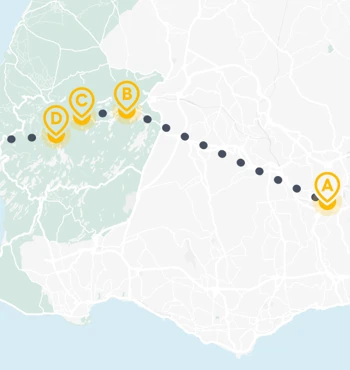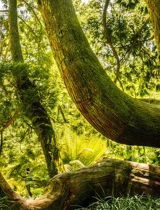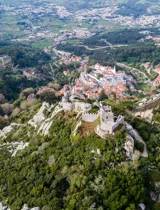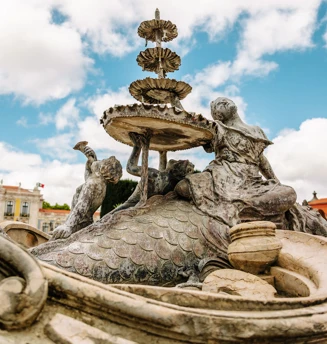
Open Air Route
Sintra from East to West
MORNING
Start the day with a visit to the National Palace of Queluz and its Gardens, where the light shines that little bit brighter, and where order, balance and beauty come together in harmony.
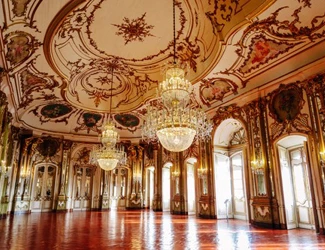
The Throne Room
This is the main state room in the palace. It was built in 1768, after the marriage of King Pedro III and Queen Maria I.
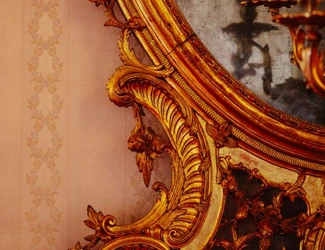
Music Room
This is one of the oldest rooms in the palace, finished in 1759, with décor that features musical motifs.
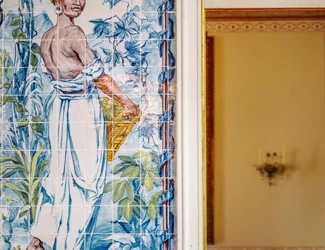
Tiled Corridor
Decorated with polychromatic neoclassical tiles, this colourful corridor shows representations of the seasons, the continents, scenes from classical mythology, singerie, chinoiserie and hunting scenes.
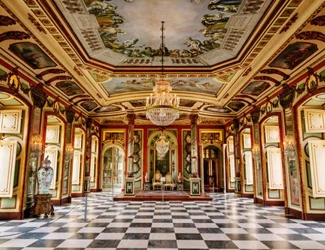
Ambassadors Room
This room, also known as the Room of Serenades, was where King Pedro III and Maria I used to hold concerts.
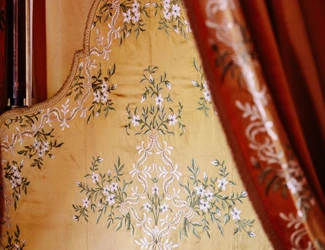
Don Quixote Room
This rococo-style room is decorated with paintings depicting episodes from Cervantes’ work, The Ingenious Gentleman Don Quixote of La Mancha. Pedro IV, King of Portugal and Emperor of Brazil, was born and died in this room.
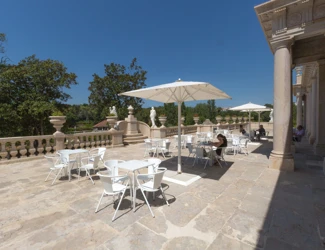
Cafeteria
Before starting the route through the Gardens, you can recharge your batteries in the Palace Cafeteria, enjoying the terrace with its views over the Tiled Canal and the surrounding greenery.
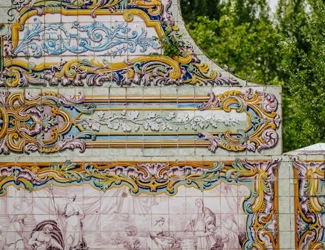
Tiled Canal
The Tiled Canal was created for the leisure and entertainment of the Royal Family and the court, providing the ideal setting for trips in gondolas on the canal, theatre performances, musical and literary soirées, masked balls, games and open air recitals.
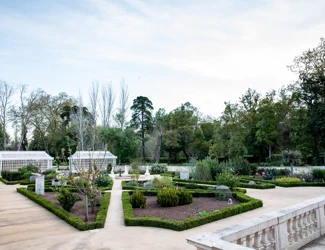
Botanical Garden
Built between 1769 and 1776, the Botanical Garden of the National Palace of Queluz was designed with consideration to the popularity of collecting at the time, stimulated by the discovery of the curiosities of the New World and the ideas buzzing in the minds of naturalists. A fine botanical collection was brought together here, which included the planting of pineapple plants, the fruit being particularly enjoyed by King Pedro III and served at royal banquets as an exotic delicacy.
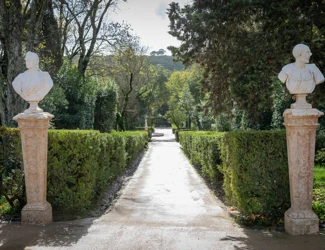
Groove
Formed of 38 plots, the Groove is an essential element in the design of eighteenth-century gardens, framing and highlighting the sections of the delicate flowerbeds created in the flat sections, creating perspective and zones of shade, and giving the garden scale.
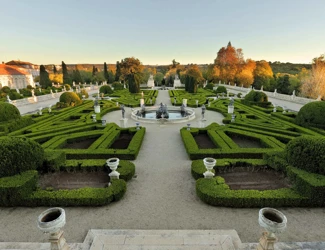
Parterre
The Parterre of the Palace of Queluz, the Malta Garden and the Hanging Garden, were designed to integrate with the internal façades, corresponding to the sections of the building containing the Throne Room and Ambassadors Room. Planned according to the principles of eighteenth-century garden composition, which reflected the values of order, clarity, proportion and harmony, these are parterre (flat surface) gardens composed of geometric designs, as though they were pieces of embroidery or rugs, to be admired as works of art. The lines and embellishments of box hedging were cut to a low level, so that the designs could be seen, and the water elements, the balustrades and statuary, sculpted from stone and lead, completed the scene.
MORNING
After emerging from the luxury and opulence of the eighteenth century, travel to the historical centre of Sintra, where you will find the oldest palace in Portugal, preserved through centuries of the country’s history.
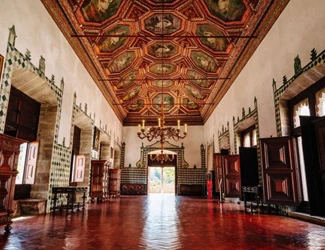
Swan Room
This room is named after the white swans that decorate its ceiling. It is the largest room in the palace and the place where the most important functions were held, such as ambassadorial receptions, banquets and celebrations.
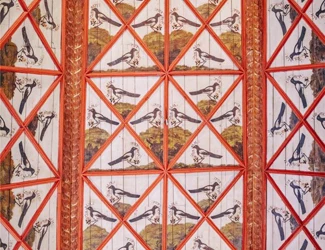
Magpie Room
The name of this room is explained by the 136 magpies painted on the ceiling. The birds hold the banner of King João I in their beaks, with the motto ‘por bem’ (for good), and in their claws grasp a rose that may refer to the House of Lancaster, the house of Queen Philippa, his wife.
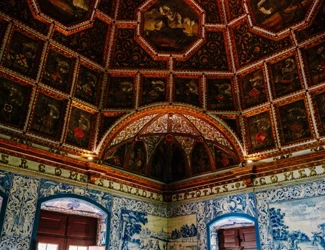
Room of the Coats of Arms
Located in the highest part of the Palace, the Room of the Coats of Arms is the finest example in the building of Manueline intervention and the most important heraldry room in Europe.
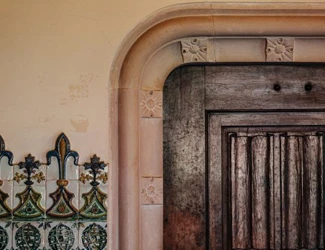
Queen Maria Pia’s Royal Chambers
Located on the upper floor of the east wing of the palace, these chambers were used by Queen Maria Pia of Savoy (1847-1911), the last queen to live in this palace.
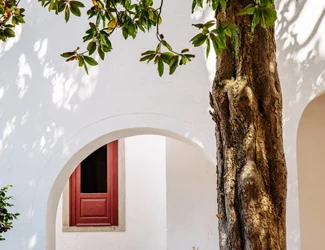
The Preta Garden
In the grounds of the National Palace of Sintra, don’t miss a the recently restored Preta Garden, named after the singular relief figure of a black woman that decorates it.
AFTERNOON
After visiting the palace where, for centuries, the Portuguese court sought refuge in the summer months, head now towards the Park and Palace of Monserrate, one of the most beautiful Romantic landscape creations and the most significant English garden in Portugal. Based on the ideas of Sir Francis Cook, the palace and surrounding park attracted and inspired countless travellers, writers and artists during the 19th century.
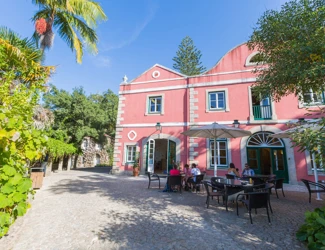
Tea Room
On arrival, make the most of the serenity and cool of the Tea Room, located in the heart of the garden, for lunch.
(At certain times of the year, the cafeteria service may be closed. See the page dedicated to cafeterias and restaurants for more information.)
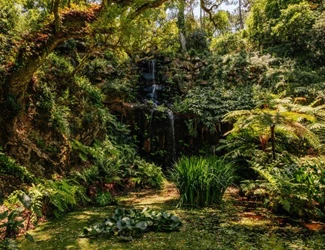
Beckford’s Waterfall
After a revitalising lunch, it is time to explore the park. Start the route at the Waterfall created by William Beckford, the English writer who lived in Monserrate in the late 18th century. It is an artificial waterfall surrounded by botanical species from all corners of the globe and the perfect place to take photos.
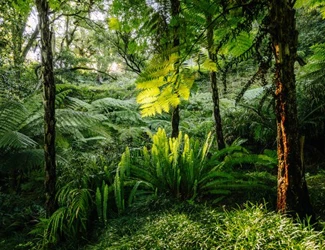
Fern Valley
The Park of Monserrate boasts a remarkable botanical collection, with species from all over the world. The path that descends from the Waterfall leads along Fern Valley, where the very particular climatic conditions allowed Sir Francis Cook, owner of Monserrate in the 19th century and the key figure behind the garden and palace we see today, to amass here an impressive collection of ferns, the highlights of which are the arboreal ferns from Australia and New Zealand, which were much admired in Europe at the time for their exoticism.
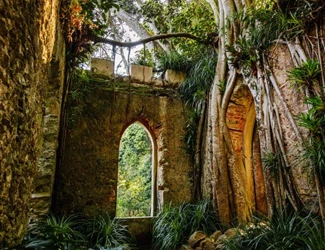
Ruin
False ruins swallowed up by vegetation, such as this one, halfway up the slope at the end of Fern Valley, were vital elements in romantic gardens. One of their main purposes was to provide the visitor with a range of flights of imagination: journeys through space, through the exoticism of the botanical collections, or the architectural references, and journeys through time, through constructions such as this. Accept Sir Francis Cook’s invitation to travel through space and time, before continuing on your route.
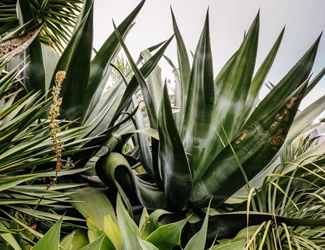
Mexican Garden
Continuing on the path along the cool, shady slope of the Ruin of Monserrate, we reach the warmest, driest part of the estate, where the Mexican Garden is to be found. This garden contains collections of plants from hot climates, such as palm, yucca, nolina, agave and cycas.
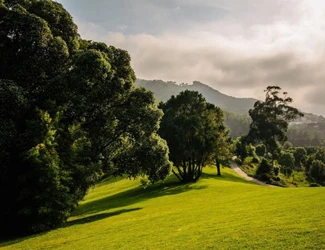
The Lawn
The Lawn offers a well-deserved break from the walk, with beautiful views over the diverse treetops of the park and the ocean. This was the first lawn planted in Portugal, its large area and curvature requiring, at the time, the devising of an ingenious gravity-based watering system.
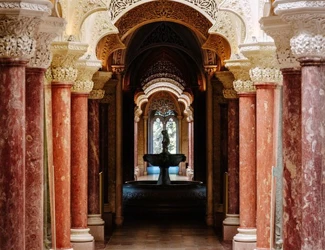
Central Gallery
On entering the Palace, note the exoticism of the plant motifs and the intricacy of the architectural elements, which allow the nature outside to extend into the interior rooms and reproduce the play of light and shadow experienced in the garden, under the trees.
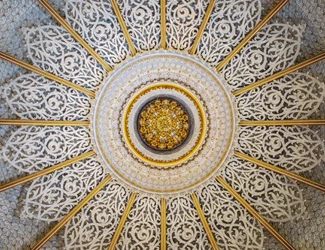
Music Room
This circular room occupies the entire north tower of the building. The cupola, with busts of neoclassical inspiration referring to the arts on display at its base, has excellent acoustics, of which the Cook family took advantage in the recitals they held when staying at Monserrate during the summer months.
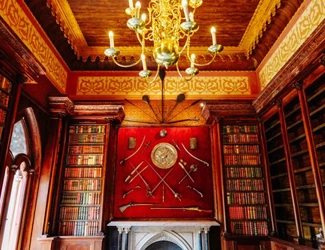
Library
The Library was the only room on this floor with a door. With walls covered in shelves, it had as a central piece of furniture a large walnut root desk and, above the hearth, a panoply of weapons on display.
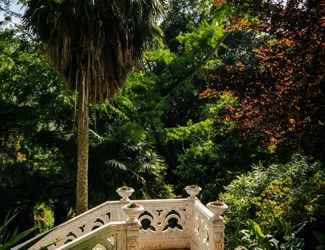
Scented Path
After visiting the palace, the way back to the park’s exit leads you across the Scented Path, flanked by two pergolas over which climbing plants such as wisteria and honeysuckle grow, flowering with a beautiful perfume in spring and early summer.
AFTERNOON
Travel now from Monserrate to the Convent of the Capuchos, first passing through Colares and then the hamlet of Pé da Serra, where you will see signposts for the Convent of the Capuchos. This route takes around 30 minutes.
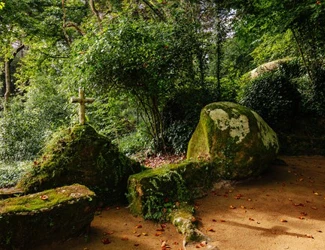
Courtyard of the Crosses
Your discovery of this unique convent house, established in 1560 and inhabited by Franciscan friars for almost 300 years, will start in the Courtyard of the Crosses, from which you can access the convent through the Boulder Gate, where once you had to ring the bell to enter. The three crosses that stand in the courtyard represent Golgotha, where Christ was crucified.
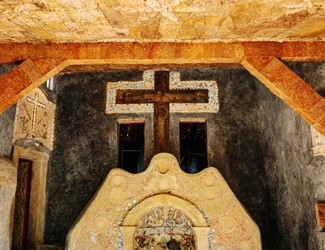
Porch
The entrance Porch to the convent was accessible to pilgrims. The decorative elements used symbolic language to allow new arrivals to understand the living guidelines of the friars who lived in the convent. The three knots on the cord symbolise the three vows these men took: poverty, obedience and chastity.
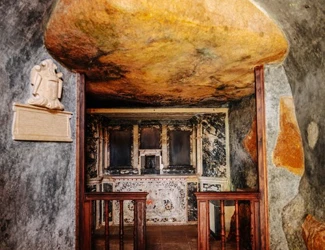
Church
This unique church resembles a cave, evoking the legend of the founding of the convent, according to which King João III was hunting in these hills, on a warm summer’s day, and, feeling tired because of the heat and the thrill of the hunt, he sought the shaded shelter of a large granite rock, under which he ended up falling asleep. The legend goes that, as he slept, the King dreamt of angels adoring the Holy Cross in the hollow of the cave in which he rested and, when he awoke, he ordered the founding of a convent in that place, consecrated to the Holy Cross, as he had dreamed, to be entrusted to the Franciscan Order.
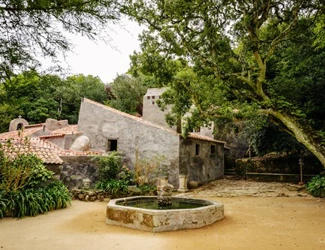
Cloister and the Convent Woods
In the Cloister, surrounded by a dense wood of native vegetation, the friars practised the exercise of contemplation. The small wood in the convent grounds benefited from the friars’ protection for centuries, having survived the intense deforestation suffered by other parts of the Sintra hills, and is now the oldest patch of vegetation native to the Sintra area.
AFTERNOON
Finish the day at the most westerly point, not just of the Sintra Mountains, but also of the European mainland. To get there, take the road back to the hamlet of Pé da Serra and from there continue south, towards Cascais, following the signposts for Cabo da Roca.
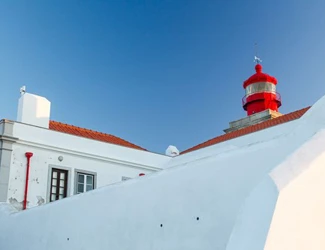
Lighthouse
In operation since 1772, this is one of the oldest lighthouses in Portugal. Its imposing, 22-metre tall tower and its red colour make this promontory unmistakeable.


